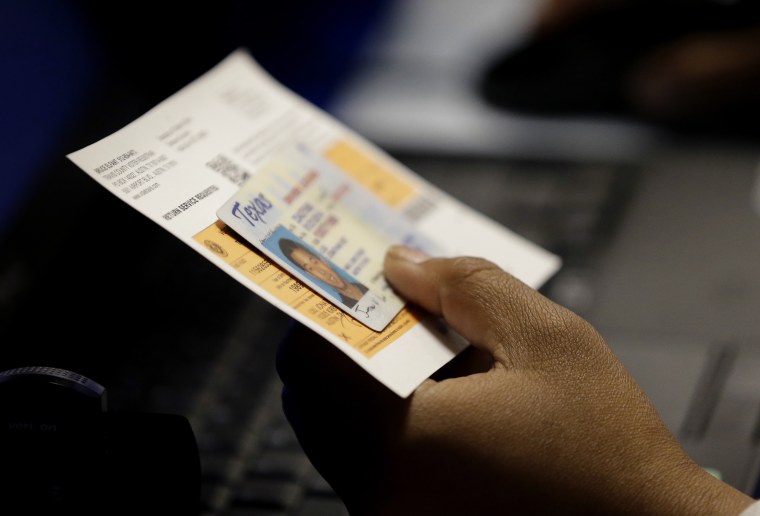Since Texas’ strict voter ID law went into effect in 2013, the stories of voters disenfranchised by the law have come thick and fast: A 70-year-old African-American woman who doesn’t drive and wasn’t told about the ID law when she registered to vote after moving to Dallas from out of state. A Houston student who needed to assemble a long list of documents to prove his residency. An African-American man who has never left Austin and was denied a state ID because his birth certificate lists his mother’s name. An elderly woman who couldn’t afford the $42 to get a birth certificate from her native Mississippi and without which she couldn’t get ID. An estimated 600,000 registered Texas voters —and around 1.2 million eligible voters — don’t have the ID required under the law.
On Tuesday, the U.S. 5th Circuit Court of Appeals in New Orleans heard arguments in the ongoing challenge to the ID measure, which remains in effect despite three different federal court decisions determining that it discriminates against racial minorities. The case could well wind up before the U.S. Supreme Court, which has yet to clearly spell out when voting restrictions like ID laws violate the Voting Rights Act (VRA). Seventeen states have new voting restrictions in place for this year’s presidential election — the first in over half a century to be held without the full protections of the VRA.
RELATED: Texas keeping thousands from registering, voting group alleges
Texas’s ID law is the strictest in the country. Voters must show one of a handful of types of ID, including a state driver's license or state ID card, a concealed handgun license, a U.S. passport, a military ID card or a U.S citizenship certificate with a photo. Student IDs, even from state universities, aren’t allowed.
In Tuesday’s one-hour hearing, the plaintiff’s case was presented by Erin Flynn, a lawyer with the U.S. Justice Department, as well as Janai Nelson of the NAACP Legal Defense Fund and Texas election lawyer Chad Dunn. Texas Solicitor General Scott Keller spoke for the state.
Ezra Rosenberg, a lead lawyer for the plaintiffs, told MSNBC that several of the judges asked why Texas didn’t include provisions in its law to make the process easier for eligible voters without ID. Both North and South Carolina, for instance, allow voters without ID to cast a regular ballot if they sign an affidavit affirming their identity — though voting rights advocates worry that poll workers don't always offer that option as they're supposed to. That suggests the court could potentially be headed toward a middle ground that would approve a softened version of the law.
Central to the case may be a dispute about the very parameters of the Voting Rights Act. Keller argued that any claim that the law is racially discriminatory must be tied to evidence of decreased turnout. There’s little evidence that turnout has indeed decreased since the law has been in effect. But the plaintiffs contend that the law doesn’t require evidence about the impact on turnout, which can fluctuate for all sorts of reasons. Rather, they say, if racial minorities are less likely to have ID, and that’s a result of a history of social and economic discrimination — all of which were found by a district court to be true in this case — that’s enough to violate Section 2 of the VRA.
The law’s path to this point has been winding. It was enacted in 2011 by Texas’s Republican-controlled legislature, amid growing concern among conservatives about the state’s soaring Hispanic population and its potential to transform the electorate. GOP legislators had tried in the two previous sessions to pass an ID law but been thwarted by Democrats. This time they used unorthodox parliamentary procedures to ram the measure though.
In August 2012, a federal appeals court panel blocked the law as racially discriminatory. It acted under Section 5 of the Voting Rights Act, which at that time required Texas and other states with histories of racial discrimination in voting to get federal approval before making changes to their voting rules.
But in June 2013, the Supreme Court invalidated Section 5, saying that it wasn’t fair to single out the South for special scrutiny because it’s made progress on race since the civil rights era. Hours later, Texas announced that the ID law would go into effect.
RELATED: Missouri GOP advances constitutional amendment on voter ID
But the following year, U.S. District Court Judge Nelva Gonzales Ramos, in a scathing opinion, struck down the law under Section 2 of the VRA, which bars racial discrimination in voting, and also found that it’s an unconstitutional poll tax. Gonzales Ramos wrote that the law was passed in part because of, not in spite of, its impact on minorities. And yet, after Texas appealed, the Supreme Court again stepped in to say the law had to stay in place for the 2014 midterm elections, during which it disenfranchised numerous voters and may have swung Texas’s only competitive congressional race.
Last year, a three-judge panel of the 5th Circuit upheld most of Gonzales Ramos’s ruling, though it found that the law doesn’t qualify as a poll tax. But it kept the law in force while Texas appeals to the full 15-judge 5th Circuit. The Supreme Court has given the appeals court until July 20 to rule.
Texas argues that the law is needed to stop in-person voter fraud, which Gov. Greg Abbott has described as an “epidemic.” But experts say there have been only two cases of such fraud in the state out of several million ballots cast in recent years. And the plaintiffs have pointed out that the law doesn’t require an ID for absentee ballots, even though that’s where fraud is far more likely to occur. In addition, some of the forms of ID that are accepted under the law can be obtained by non-citizens, who aren’t eligible to vote.
